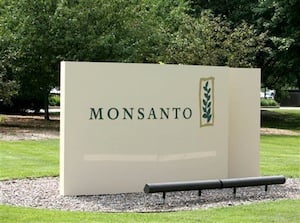Monsanto Glyphosate Roundup Herbicide Triggers Autism in Children. MIT Scientist

A senior scientist at MIT has declared that we are facing an epidemic of autism that may result in one half of all children being affected by autism in ten years.
Dr. Stephanie Seneff, who made these remarks during a panel presentation in Groton, MA last week, specifically cites the Monsanto herbicide, Roundup, as the culprit for the escalating incidence of autism and other neurological disorders. Roundup, which was introduced in the 1970’s, contains the chemical glyphosate, which is the focal point for Seneff’s concerns. Roundup was originally restricted to use on weeds, as glyphosate kills plants. However, Roundup is now in regular use with crops. With the coming of GMO’s, plants such as soy and corn were bioengineered to tolerate glyphosate, and its use dramatically increased. From 2001 to 2007, glyphosate use doubled, reaching 180 to 185 million pounds in the U.S. alone in 2007.
If you don’t consume corn- on- the -cob or toasted soybeans, however, you are hardly exempt from the potential effects of consuming glyphosate. Wheat is now sprayed with Roundup right before it is harvested, making any consumption of non- organic wheat bread a sure source for the chemical. In addition, any products containing corn syrup, such as soft drinks, are also carrying a payload of glyphosate.
According to studies cited by Seneff, glyphosate engages “gut bacteria” in a process known as the shikimate pathway. This enables the chemical to interfere with the biochemistry of bacteria in our GI tract, resulting in the depletion of essential amino acids .
Monsanto has maintained that glyphosate is safe for human consumption, as humans do not have the shikimate pathway. Bacteria, however, does—including the flora that constitutes “gut bacteria.”
It is this ability to affect gut bacteria that Seneff claims is the link which allows the chemical to get on board and wreak further damage. The connection between intestinal flora and neurological functioning is an ongoing topic of research. According to a number of studies, glyphosate depletes the amino acids tyrosine, tryptophan, and phenylalanine, which can then contribute to obesity, depression, autism, inflammatory bowel disease, Alzheimer’s and Parkinson’s.
Monsanto disagrees. The food and chemical giant has constructed a webpage with links to scientific studies pronouncing the safety of glyphosate.
Other science writers have also taken up the Monsanto banner, scoffing at the scientific studies that prompted Seneff to make her claims. “They made it up!” pronounced Huffpost science writer Tamar Haspel, in an article thin on analysis but heavy ondeclarative prose.
Others, such as Skeptoid writer and PhD physicist Eric Hall, take a more measured approach, and instead focus on the studies which prompted the glyphosate concerns. According to Hall, Seneff is making an error known as the “correlation/causation error,” in which causality is inaccurately concluded when there exists only the fact that two separate items—in this case, the increased use of glyphosate and the increased incidence of autism—may be observed but are not, in fact, directly related.
Seneff’s pronouncements focus specifically on the glyphosate issue. As we know, there are other potential tributaries which may be feeding the rise in autism and also causing age-related neurological conditions, such as Alzheimer’s. These may include contents of vaccines, aluminum cooking ware as well as other potential sources for chemical consumption.
Read more at http://journal-neo.org/2015/01/26/mit-states-that-half-of-all-children-may-be-autistic-by-2025/
Janet C. Phelan, investigative journalist and human rights defender that has traveled pretty extensively over the Asian region, an author of a tell-all book EXILE, exclusively for the online magazine “New Eastern Outlook

